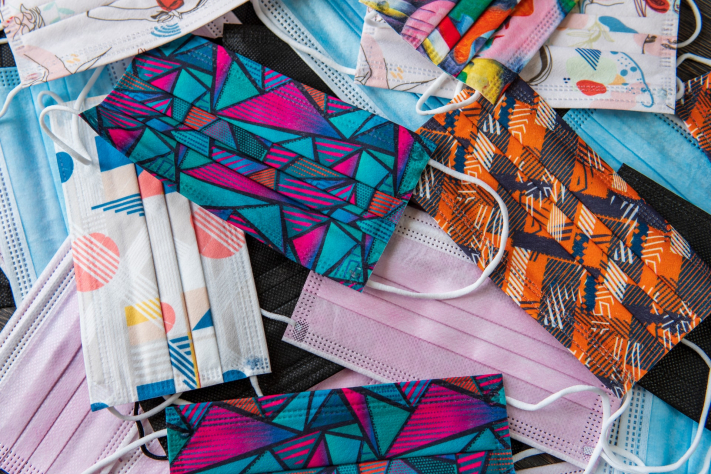
If you're anything like the Daily Info team, you'll probably have a sizeable collection of reusable, possibly homemade, face masks, to keep you and others safe from coronavirus when out and about. But every now and then, you might forget yours, or require an emergency bus trip, and have to resort to using a disposable mask. Then, the environmental guilt sets in, since the must-have pandemic accessory is notoriously difficult to recycle, and is slowly piling up in landfill and the city verges.
Guilty Conscience

Lies Thru a Lens ?, CC BY 2.0, via Wikimedia Commons. Modifications by Daily Info not endorsed by licensor.
It's a difficult balance between wanting to keep the community safe, and not wanting the wellbeing of yet more local wildlife on your conscience, since they pose a risk to animals attempting to eat, fornicate with, or otherwise get entangled in, the discarded bits of cloth. It's a tricky issue that has had many environmentalists scratching their heads (but crucially, not touching their faces)!
Fortunately, one brilliant Oxford business student has now come up with a solution to help us all breathe a bit easier about following the rules. Avril Poisson (20) found she had lots more free time between lectures since all teaching moved online, and, after completing a module on Caring Consumerism, decided that a mask-focused social enterprise would be her first real-world opportunity to put her studies into practice.
Taking the pith
Poisson explained: 'I hate throwing things away knowing they'll go to landfill, so ever since the start of lockdown I kept every mask in my flat whenever I came back from the shops. My flatmates started to complain as after a few weeks they were occupying all our shared surfaces and even encroaching on people's private spaces. I thought, "I can't be alone in this, and if it's this bad for students, imagine how the wildlife must be feeling?" For my course I'd read about companies who recycle plastic bottles, orange pith and bamboo into new soft fabric and even pineapples into leather to produce clothes. Unfortunately, masks use multiple different kinds of fabric that can't easily be separated to recycle, so I decided to focus on the next R - Reuse'
Prof Issa Hokes, an Ethnoanthropologist specialising in Textile Reuse pointed out many examples of similar practice which can be seen in the Pitt Rivers, from a doily that acquired magical powers in 1842, to the Mary Quant Tea Towel Dress housed in the Upper Gallery. “Textile reuse is as old as textiles,” he said. “You can clearly imagine early cave men arguing over the latest animal skin and whether it looked better on the floor as a rug or worn as a dress. Ms Poisson has joined a fine tradition.”
Poisson then took a rather systematic approach to finding a new use for the masks, by going through a dictionary and replacing syllables in nouns with the word 'mask'. After throwing out 'maskasins' (mask-moccasins, which turned out not to be sturdy enough for footwear) and 'maskolines' (masks stretched over a circle of wire, to produce a miniature trampoline for your fist, which sadly resulted in Poisson spraining her wrist), she arrived at the concept for Maskinis, a new type of swimwear which uses the shape of the mask to surprisingly ergonomic effect.

Because she doesn't have access to any specialised manufacturing or cleaning equipment, Poisson cleans all the masks herself in large pans of boiling water mixed with a little anti-bacterial hand gel, before tying them together, making full use of the shape and strings to ensure appropriate coverage and flexible design. As you can see from the designs below, which Poisson’s friend who is a graphic designer has shared exclusively with Daily Info, the shape of the masks lends itself well to a variety of style, from bandeau tops to eye-catching halternecks. The swimsuits are also modular, so masks can be added or removed to accommodate different sizes.

Thanks for the Mammaries
People can deposit used masks with Poisson to be used in the general production line, or if you have a mask with a special memory attached (a bus journey to a six-person wedding, for example, or perhaps the medical mask you wore for your first vaccine jab) you can commission Poisson to make it into a custom-made piece.

We think that finding a fashionable solution to such a current problem, while also tapping into a demand for swimwear which will surely accompany the new craze for wild swimming, is an idea almost too good to be true, and we can't be the only ones: several big backers, all family members of Poisson's college friends, have already invested in the idea. We're always delighted when an idea started in Oxford gains international attention, so we'll be stocking up when Maskinis hit the shelves, and holding our breath for them to be modelled in Vogue in the not-too-distant future...



